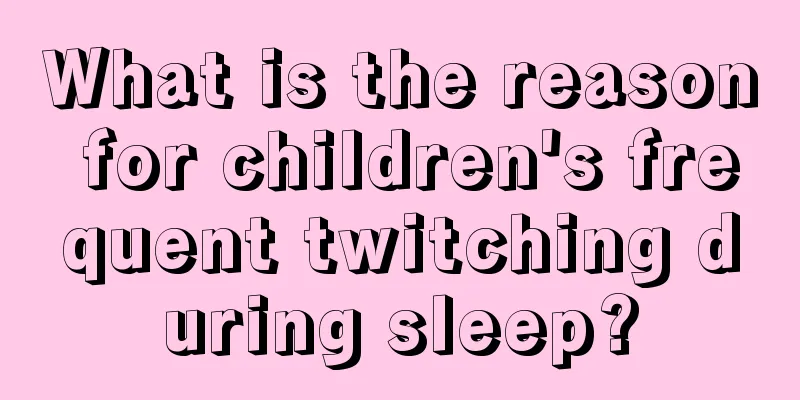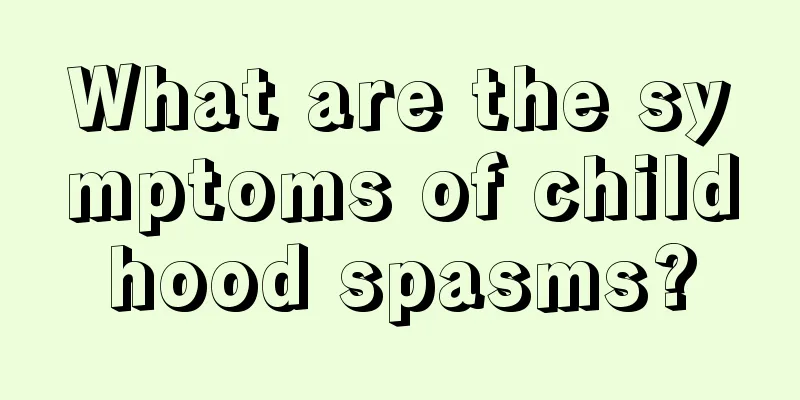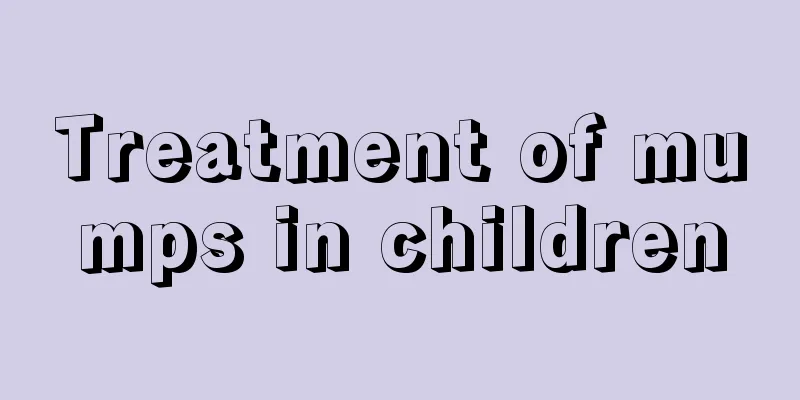What is the reason for children's frequent twitching during sleep?

|
If some children have frequent convulsions when they sleep, parents should pay attention. There are many reasons for children's frequent convulsions, including physiological reasons and disease reasons. For example, if the child does not sleep well, the room is overheated, etc., these symptoms may occur. There are also some disease reasons. For example, if the child has a temporary disorder in brain function, it is easy to have such impulsive twitching symptoms. Of course, the reason of calcium deficiency cannot be ignored. Children are prone to calcium deficiency. When children are calcium deficient, the nerve membrane is more excited, which can trigger the child to have frequent twitching symptoms. 1. Temporary disturbance of brain function A baby's sleep convulsions are also a manifestation of temporary brain dysfunction. The cerebral cortex of a newborn is not yet fully developed, so the activities of the limbs are mainly controlled by the subcortical center, resulting in involuntary and purposeless shaking of the limbs. For example, if you suddenly hear a sound, your muscles will tremble all over your body; or if you are suddenly startled when you transition from sleep to wakefulness, these are all normal. In addition to systemic or local muscle twitching, more common manifestations include nystagmus, staring, repeated blinking, screaming, facial tremors, and swinging forearms back and forth, which are all manifestations of convulsions. Some newborns also show symptoms of respiratory arrest and cyanosis. At this time, parents do not need to be too nervous. They can calm their child down by gently pressing any part of his body with their hands. An unswaddled newborn can also be calmed by holding his shoulders or holding him in your arms. However, if the baby twitches too frequently while sleeping, it may be caused by calcium deficiency or brain damage. Parents need to pay attention and give the baby calcium supplements in time or take the baby to the hospital for examination and treatment. 2. Calcium deficiency Because when a child is in a low calcium state, the excitability of the nerve membrane increases, and various forms of spasms and convulsions may occur. Therefore, if the baby always convulses while sleeping, you should consider whether the baby is calcium deficient. If the baby also has symptoms of calcium deficiency, such as excessive sweating, waking up easily at night, and symptoms of rickets, then it can be determined that the baby is calcium deficient and calcium supplementation should be given in time. In addition, other metabolic abnormalities can also cause babies to twitch while sleeping, such as hypoglycemia (common within 3 days after birth), hypomagnesemia, hypokalemia: vitamin B6 deficiency; abnormal bilirubin metabolism, abnormal amino acid metabolism, hyperketoacidemia, etc. 3. Epilepsy Benign epilepsy of children with central temporal spikes is a common type of childhood epilepsy, accounting for about 15%-20% of childhood epilepsy. Most of them occur between 5 and 10 years old, with the most common being 9 to 10 years old. It is often related to genetics, and children with the disease can often be traced back to a family history of epilepsy. Its attacks are significantly correlated with sleep, with approximately 51%-78% of children experiencing attacks during sleep at night. Most of them occur within half an hour to an hour after falling asleep or before waking up in the morning. A few have attacks both while awake and asleep, and a few only have attacks during the day, often during naps or when feeling sleepy. 4. Intracranial diseases ① Cerebral ischemia and hypoxia: convulsions caused by this reason account for 2/3 of all cases, and the onset is generally concentrated within 24 hours after the birth of the newborn; ②Intracranial hemorrhage: Convulsions and convulsions caused by this type of cause usually occur 2-3 days after birth; ③ Cerebral infarction: Arterial obstruction is the most common and is likely to occur 4 days after the birth of a newborn. 5. Infection Infections with pathogenic microorganisms, such as meningitis, brain abscess, sepsis, tetanus, etc., can all cause convulsions in babies. It is particularly important to note that tetanus patients usually experience clenched teeth at the same time as convulsions occur. If the baby has been infected in the mother's womb, convulsions will generally occur 3 days after birth; if the baby is infected after birth, similar phenomena will often occur 1 week later. |
<<: What is the best age to correct a child's crooked front teeth?
>>: How to treat chickenpox in children
Recommend
What to do if your child keeps hiccuping
Although hiccups are common, prolonged hiccups ca...
What to do if a child has pimples on his eyelids
During the development and growth stage of childr...
How to take care of your baby if he has a cold, stuffy nose and fever
How many parents in the world are worried about t...
How to choose milk powder for two-year-old baby
When babies are just born, they drink breast milk...
What should I do if my child keeps having a fever and coughing?
Children have low immunity and are prone to fever...
What to eat to improve children's memory
During the childhood stage, children's brains...
Does baby's knee cracking affect health?
When families find that their children's heal...
Should newborns take medicine before or after feeding?
After being born, newborns are very susceptible t...
One-year-old baby has a runny nose due to a fever and cold
The body resistance of a one-year-old baby is ver...
What are the classifications of infantile polycystic kidney disease?
Pregnancy is the happiest thing for parents. All ...
What causes children's bad breath?
If bad breath occurs, it will cause great trouble...
What should I do if my twelve-year-old child is nearsighted?
Myopia in children is a very serious problem. It ...
Why does it hurt when boys urinate?
When there are children at home, you must pay spe...
What should I do if my baby always refuses to eat?
The baby's eating problem has always been a h...
What to do if a three-month-old baby has a poor appetite
If a baby who is still breastfeeding shows that h...









